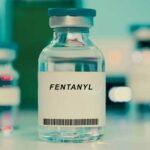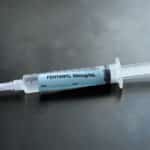- How Naloxone Works As An Antidote
- Does Naloxone Have Risks?
- Treatment Options For Fentanyl Abuse & Addiction
Naloxone can act as an antidote for fentanyl overdose. Naloxone is an opioid antagonist that can reverse slowed breathing, a life-threatening side effect of opioid overdose.
Naloxone is available as an intravenous liquid or nasal spray known as Narcan. Narcan is simple to use and can be administered by people without formal training. Narcan can sustain an overdose victim in the time before first responders arrive.
Fentanyl is a potent synthetic opioid. Healthcare providers divide fentanyl into small doses when prescribing it, but the drug is also popular on the illicit drug market. Fentanyl contributed to tens of thousands of drug overdose deaths in 2020. Fentanyl use is an ongoing public health risk.
How Naloxone Works As An Antidote
Naloxone bonds to opioid receptors in the central nervous system. Prescription opioids like fentanyl, codeine, and oxycodone also bind to these receptors. Naloxone blocks fentanyl from affecting these receptors, reversing fatal overdose symptoms and preventing further health effects.
Naloxone may be given to a person showing signs of opioid overdose. Family members or bystanders may give Narcan to a person showing symptoms such as:
- respiratory depression (slowed or stopped breathing)
- faint or undetectable pulse
- clammy skin
- gurgling noises or vomiting
- severe sedation
- unconsciousness or coma
Although naloxone affects the same receptors as opioids, it may have little to no effect on people who are not taking opioids.
Does Naloxone Have Risks?
Naloxone is a fast-acting substance. Once the effects of naloxone wear off, the effects of opioids that remain in the body may return. This can lead to a fentanyl overdose hours after a dose of naloxone was given.
A patient who recovered from an overdose after taking naloxone should be monitored for up to 2 hours after their last dose.
Naloxone can cause withdrawal symptoms in patients who are physically dependent on opioids, since naloxone bonds to the same receptors as prescription opioids. Withdrawal symptoms may include headache, cramping, and muscle aches, but tend to be less severe than an overdose.
Treatment Options For Fentanyl Abuse & Addiction
The overdose antidote naloxone can be crucial in saving an overdose victim’s life. However, naloxone may not address long-term opioid abuse problems.
Fentanyl overdose may be a sign of a substance use disorder, a long-term mental health problem characterized by continuous drug abuse.
An addiction treatment program can lower the risk of a fentanyl overdose in the long-term. Treatment programs may use behavioral therapy, medication, and other methods to replace illicit drug use with healthier, more sustainable lifestyle habits.
To learn how we treat opioid addiction in an outpatient setting, please contact us today.
Sources
Written by
Northeast Addition Editorial Team
©2024 Northeast Addition Center | All Rights Reserved
This page does not provide medical advice.




